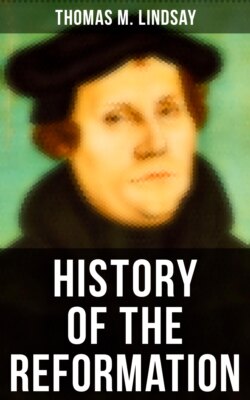Читать книгу History of the Reformation - Thomas M. Lindsay - Страница 11
На сайте Литреса книга снята с продажи.
§ 1. The small extent of Christendom.
ОглавлениеTable of Contents
During the period of the Reformation a small portion of the world belonged to Christendom, and of that only a part was affected, either really or nominally, by the movement. The Christians belonging to the Greek Church were entirely outside its influence.
Christendom had shrunk greatly since the seventh century. The Saracens and their successors in Moslem sovereignty had overrun and conquered many lands which had formerly been inhabited by a Christian population and governed by Christian rulers. Palestine, Syria, Asia Minor, Egypt, and North Africa westwards to the Straits of Gibraltar, had once been Christian, and had been lost to Christendom during the seventh and eighth centuries. The Moslems had invaded Europe in the West, had conquered the Spanish Peninsula, had passed the Pyrenees, and had invaded France. They were met and defeated in a three days' battle at Tours (732) by the Franks under Charles the Hammer, the grandfather of Charles the Great. After they had been thrust back beyond the Pyrenees, the Spanish Peninsula was the scene of a struggle between Moslem and Christian which lasted for more than seven hundred years, and Spain did not become wholly Christian until the last decade of the fifteenth century.
If the tide of Moslem conquest had been early checked in the West, in the East it had flowed steadily if slowly. In 1338, Orchan, Sultan of the Ottoman Turks, seized on Gallipoli, the fortified town which guarded the eastern entrance to the Dardanelles, and the Moslems won a footing on European soil. A few years later the troops of his son Murad i. had seized a portion of the Balkan peninsula, and had cut off Constantinople from the rest of Christendom. A hundred years after, Constantinople (1453) had fallen, the Christian population had been slain or enslaved, the great church of the Holy Wisdom (St. Sophia) had been made a Mohammedan mosque, and the city had become the metropolis of the wide-spreading empire of the Ottoman Turks. Servia, Bosnia, Herzogovina (the Duchy, from Herzog, a Duke), Greece, the Peloponnesus, Roumania, Wallachia, and Moldavia were incorporated in the Moslem Empire. Belgrade and the island of Rhodes, the two bulwarks of Christendom, had fallen. Germany was threatened by Turkish invasions, and for years the bells tolled in hundreds of German parishes calling the people to pray against the coming of the Turk. It was not until the heroic defence of Vienna, in 1529, that the victorious advance of the Moslem was stayed. Only the Adriatic separated Italy from the Ottoman Empire, and the great mountain wall with the strip of Dalmatian coast which lies at its foot was the bulwark between civilisation and barbarism.
